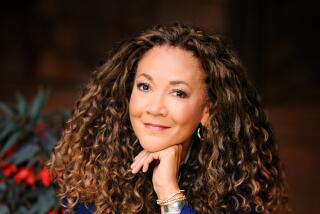Ad Group Hopes to Show How to Sell to Blacks : Marketing: A new trade association says Madison Avenue doesn’t know how to get its clients’ message across to minorities.
- Share via
Problem: Many of the ads created to appeal to black consumers come from Madison Avenue agencies with no clue about black attitudes.
Evidence: Several missteps in marketing products to blacks have caused nationwide controversy this year--the last thing advertisers want.
Solution: Why not ask blacks how to market to blacks?
That is the rallying cry of a newly formed trade group, the African American Marketing & Media Assn.
The neophyte organization--several of whose founding members are visiting Los Angeles this week--hopes to eventually become to black advertising what the powerful lobby and trade group the American Assn. of Advertising Agencies is to mainstream marketing.
“The black market has suffered from media anemia,” said Ken Smikle, president of the group, which plans to open its doors in Chicago in February.
“You see very little information on black consumers except how many of us are living below the poverty level.”
Blacks in America will spend an estimated $263 billion this year on everything from toothpaste to automobiles, said Smikle, who also publishes Target Market News, a Chicago-based newsletter on marketing to blacks.
American marketers are expected to spend only $705 million this year directly advertising to blacks, he said.
That is small change compared to the $34 billion that the nation’s top 100 advertisers spent last year to reach all consumers.
“We want the black consumer to be accurately portrayed,” Smikle said. “And we want black-owned agencies to be included in the considerations of companies marketing to blacks.”
Twenty years ago, there were fewer than a handful of black-owned advertising and promotion firms in the nation. Today, there are upwards of 35. Their combined annual billings are believed to exceed $275 million.
One top black agency owner says America’s mainstream ad agencies--which generally have few black employees in high-level jobs--are a big part of the problem.
“There would be no need for black agencies if general agencies did their jobs,” said Caroline Jones, president of the New York-based minority ad firm Caroline Jones Advertising. Jones, who played a role in creating Kentucky Fried Chicken’s original “We Do Chicken Right” campaign, is a founding board member of the new organization.
The head of the American Assn. of Advertising Agencies is the first to admit that the industry has failed to do enough to attract minorities.
“It is a problem we are still trying to address,” said John E. O’Toole, president, who says he can appreciate why the new minority ad group has formed. “They’re fulfilling specific needs that our organization cannot.”
The new group’s board also includes such black media-industry heavyweights as Clarence O. Smith, president of Essence Communications, which publishes Essence magazine; and Thomas J. Burrell, whose Chicago agency, Burrell Advertising, is regarded as one of the top minority-owned ad shops in the country.
At issue, however, is much more than a newly formed trade group. At issue is how American companies speak to black consumers.
“It’s really no mystery how blacks feel about products,” said Jones. “All you have to do is ask them.”
But many Fortune 500 companies still don’t.
And because of that, 1990 was a year when target marketing to blacks suddenly became front-page news in some American cities.
In January, tobacco giant R. J Reynolds abruptly cancelled the planned introduction of a new cigarette, Uptown, after various black groups complained about the targeting of a group whose members already disproportionately suffer from a number of cigarette-related diseases.
This summer, after some angry minority representatives painted over certain billboards in Chicago and New York, the billboard industry’s trade group recommended that its members become more sensitive in their placement of tobacco and alcoholic beverage ads in minority communities--particularly near schools, hospitals and places of worship.
And in late August, Operation PUSH called for a boycott of Nike products.
The Chicago civil rights group claimed that while Nike targeted black consumers, it had no black board members and no black-owned ad agencies or public relations firms helping it to promote the shoes.
Although Nike has agreed to speed up its hiring of black executives, the group has yet to call off its boycott.
Minority ad executives say all of these public relations snafus could have been avoided if the companies had only talked with them first.
“It’s incredible,” said Byron Lewis, chairman and chief executive of the minority-owned Uniworld Group.
“But its seems like the leaders of black agencies are rarely consulted unless there’s some overriding issue in the news.”
As a result, many companies also fail to consult with black consumers.
“Much of it goes against the grain of everything you learned in Marketing 101,” said Samuel J. Chisholm, president of a New York minority-owned agency, the Mingo Group.
“Companies need to figure out how to be more sensitive to this marketplace,” added Chisholm, who is also a founding member of the African American Marketing & Media Assn.
Executives point out that marketing effectively to black consumers is not as simple as placing TV spots on “The Cosby Show,” or running print campaigns in Ebony and Jet magazines.
“Too many companies take the black consumer for granted,” said Chisholm.
“You can’t just go out and tell black consumers that some new product is for them. Before you do anything, you have to show the black community that you care.”
More to Read
Inside the business of entertainment
The Wide Shot brings you news, analysis and insights on everything from streaming wars to production — and what it all means for the future.
You may occasionally receive promotional content from the Los Angeles Times.










